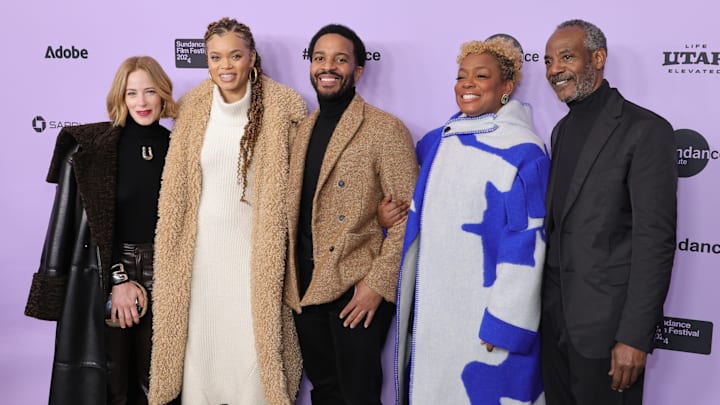For my third straight year, I will cover the Sundance Film Festival on Hidden Remote. Last year, we had thrilling debuts from Chloe Domont, Raine Allen-Miller, and Elijah Bynum. I figured what better way to kick off my coverage than watching the feature film debut from Titus Kaphar, Exhibiting Forgiveness.
Exhibiting Forgiveness follows the story of a Black artist on the path to success when he's derailed by a visit from his estranged father, a recovering addict attempting to reconcile. Together, they struggle and learn that forgetting might be more complicated than forgiving. The film stars André Holland and Andra Day.
Tarrell (Holland) is a present father and faithful husband to his wife, Aisha (Day). The family is bracing for Tarrell's mother, Joyce (Aunjanue Ellis-Taylor), to move in with them. After getting lauded by a critic for his work, Tarrell is approached to do another gallery showing. Although hesitant because he promised it was her turn, Aisha agrees to let Tarrell do the showing as long as he keeps his word.
"I thought the first time you would meet him, he would be in his casket."Tarrell
La'Ron (John Earl Jelks) is an addict who finds himself at rock bottom even when he is trying to help others. When we first meet him, he witnesses a store being robbed and attempts to help. Instead, he finds himself battered and beaten. When Tarrell goes to pick up his mother, she attempts to provide a family reunion with him and his father. Although reluctant to speak to him, he agrees for his mom's sake.
In his feature film debut, Titus Kaphar tells a complicated tale of a father-son relationship deeply rooted in trauma. Kaphar opts to not only tell the story of La'Ron's wounds but also show us the trauma Tarrell experienced in his childhood. La'Ron tells the story about his father pulling a gun on his grandmother, yet showing empathy towards him. Also, Joyce shares that exact empathetic nature towards La'Ron regardless of what he did. Tarrell can't grasp the idea of the forgiveness they show. His wounds are too deep.
Kaphar challenges Tarrell and the audience by asking, "How can you forgive when forgiveness doesn't feel like an option?" I've fought hard to overcome this question myself. We often stay stuck in the past, trying to fight these demons created within us due to trauma, and the trickle-down effect can hinder not just us but also those we love. Much like Tarrell in the film, I haven't found the answer, but his parting words to his father, "You took the past, and man, I forgive you. But the future, that's mine," might be a place to start.
André Holland's ability to bring balance to this loving husband/father whose past is something he can't seem to overcome is remarkable. Every emotion you feel within Tarrell is painted beautifully with every move. It's often seen in his loudest moments but even more powerfully conveyed in his silence. Holland is a name some know, but after this, he should find himself at the forefront of everyone's hearts.
The film's ensemble sees some outstanding work from Andra Day, Aunjanue Ellis-Taylor, and John Earl Jelks. While Holland does much of the heavy lifting, his work wouldn't be as effective without those around him. As for Jherek Bischoff, he delicately crafted one of the most awe-inspiring scores that binds the film together.
Kaphar's ability to intertwine Tarrell's art to link his past and present was one of his most profound feats. His attention to detail in this film creates this resounding emotional impact that causes every little moment to hit you hard. Exhibiting Forgiveness is a movie that I won't soon forget with Holland's outstanding performance and a script that grabs a hold of you and refuses to let go.
